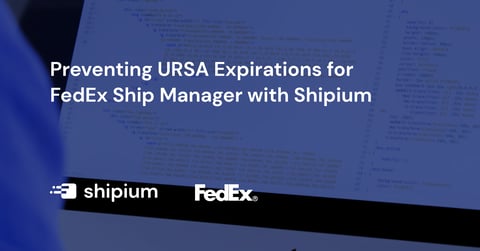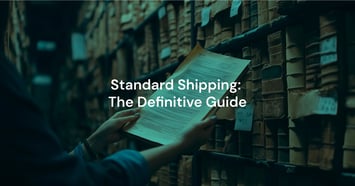URSA Expired on FedEx Ship Manager: Solutions and Prevention

URSA tables expiring for FedEx Ship Manager is a regularly occurring problem across legacy shipping technology, leaving clients frustrated with the inability to use the quality carrier services they depend on. The fault is on the vendor and their support team failing to keep their technology up to date, and not FedEx or its customers.
Because of traditional on-premise product models, those customers have zero access to the system and are reliant upon the vendor’s team to make updates to shipping processes. Due to recent layoffs across tech providers, those resources are constrained, and the majority of the customers are unable to get accurate rates and labels via the Ship Manager embedded in each legacy vendor instance, also causing FedEx label expiration.
As an ooo sun image, FedEx users are not happy when this all-too-common situation happens.
Key takeaways:
- The Universal Rating and Sorting Aid (URSA) table is used for calculating shipping rates and processing FedEx shipments within traditional systems.
- Many legacy logistics technology providers don’t track URSA table expiration dates.
- When the table expires, businesses lose access to critical FedEx Ship Manager functions, including rating, manifesting, and generating labels — causing delays and operational disruptions.
- Shipium virtualizes FedEx carrier contracts, removing the need for individual URSA table updates.
What is a FedEx URSA table?
URSA stands for "Universal Rating and Sorting Aid" and is a critical dependency for legacy-era technology to leverage FedEx Ship Manager. A FedEx URSA table is a tool used to calculate shipping costs based on a variety of factors, such as dimweights, destination, package level details, and service type.
FedEx Ship Manager is a piece of software provided by FedEx to work with its technology and systems. Almost all outdated shipping technology providers embed FedEx Ship Manager internally inside their solution as the way to interact with FedEx shipments.
The challenges of legacies product models and URSA expirations
Challenges arise when a URSA table expires, meaning rates or other details like surcharges haven't been updated before the date they were authorized for use. It effectively prevents the use of tools within FedEx Ship Manager, like rating, manifesting, shipping and return label generation, and tracking.
Historically, when this FedEx label expiration happens, a technical support representative goes into each instance of the shipping solution and updates the URSA table. When approaching dozens and then hundreds of instances, you can imagine how this becomes a major burden for everyone involved.
The shocking thing is the absence of proactive monitoring. Many of these legacy logistics technology providers typically do not have tools in place to know when a FedEx URSA table will expire. It's up to the customer to track on their own and notify the vendor, and hope the vendor can provision an engineer to update before expiration.
Learn the top mistakes when picking shipping technology for your enterprise business.
How Shipium prevents the risk of FedEx shipping label expiration
One of the key innovations of the Shipium platform is the unilateral virtualization of carrier contracts, including FedEx. Think of this platform component as a "CRM for Carriers" comprising everything from rates to ZIP-zone mappings to surcharges and contract-specific details.
This is powered by the unique way that we integrate and manage our relationships with carriers in our network. When we commence an integration, we not only do the API mapping, testing, and validation, but we also virtually model out the contract structure of that business and specific service methods.
Meaning: Sometimes, the contract structure of one service offering is different than another, even within the same company. We take it down to that level of specificity. When we are done, the carrier and service method are available to all current and future customers as a pre-integrated option.
When a Shipium client wants to use a carrier like FedEx, they simply upload their contract for that service method, and everything else is automated for a complete setup. As a result, Shipium is centralized in our management of FedEx technology, eliminating the dependency on individual URSA tables and the requirement to update customer-by-customer.
An interesting side benefit of this approach is we have access to FedEx's latest and greatest technology, including enterprise-grade APIs that FedEx views as the future of their technical strategy — which means every one of Shipium’s customers will always have the best FedEx tech available to them.
When customers choose Shipium, they:
- Eliminate older dependencies and risks that can shut down operations
- Can count on the most performant and modern experience with every carrier, including FedEx.
When paired with our ability to hit extremely fast, fully loaded rate shopping, label creation, and manifesting speeds, it’s clear why we have become one of the industry’s leading ways for enterprises to ship with FedEx.
Meanwhile, individual respective client contracts can still expire! When a Shipium customer, like a large retailer, sets up a new carrier, we document when a contract expires and provide that information to remind them of pending expirations. This helps customers get out in front of any possible errors on their side with how they manage carriers.
Modernize your supply chain and avoid FedEx label expiration with Shipium
If you are a legacy shipping tech client who experienced that outage and is frustrated, reach out to us to start a conversation on how to switch to Shipium. You won’t be alone: In 2024, five of your peers who had to handle URSA FedEx label expiration dates have already signed up to migrate to Shipium before the next peak season.
You can join this group, too. Book a demo today and see how our FedEx Compatible® platform can take your existing tech stack to the next level.
Frequently asked questions
Do FedEx labels expire?
FedEx labels do expire, and the date of expiration varies based on the label's format:
- Emailed labels: If a shipment label is emailed for later printing, it is generally valid for up to two years from the date of issue. This process allows ample time for users to print and use the label at their convenience.
- Printed labels: Label validity significantly decreases once it is printed. Printed labels are typically valid for only two weeks (14 days) from the date of printing. After this period, the label is considered expired and may not be accepted for shipping.
It’s important to notice that, while expired labels might still be readable and accepted in some cases, using them can lead to potential issues such as delivery delays or additional charges.
How do you check a FedEx label expiration date?
To check for expiration dates, look at the date printed on each FedEx parcel label. You can also visit the FedEx website and use the "Track a Shipment" feature. Enter your label's tracking number, and it will provide you with information regarding the status and validity of your label.
How long is a URSA table valid for on FedEx Ship Manager?
FedEx URSA tables typically expire after one year from issuance. This expiration requires updates to ensure accurate rates and compliance with FedEx policies and shipping services.
It’s valid to point out that a URSA expiration is related to a shipping software's ability to function correctly with up-to-date rates, while FedEx label expiration pertains to the usability of specific documents for individual packages.
How can I create FedEx shipping labels using Shipium?
With Shipium, you can easily create FedEx shipping labels by integrating your FedEx account into the platform. Use Shipium’s API or dashboard to input shipment details, select FedEx as the carrier, and generate a label instantly.

Diagonal thinker who enjoys hard problems of any variety. Currently employee #5 and the first business hire at Shipium, a Seattle startup founded by Amazon and Zulily vets to help ecommerce companies modernize their supply chains. Previously was CMO at Datica where I helped healthcare developers use the cloud. Prior to that I came up through product and engineering roles. In total, 18 years of experience leading marketing, product, sales, design, operations, and engineering initiatives within cloud-based technology companies.


